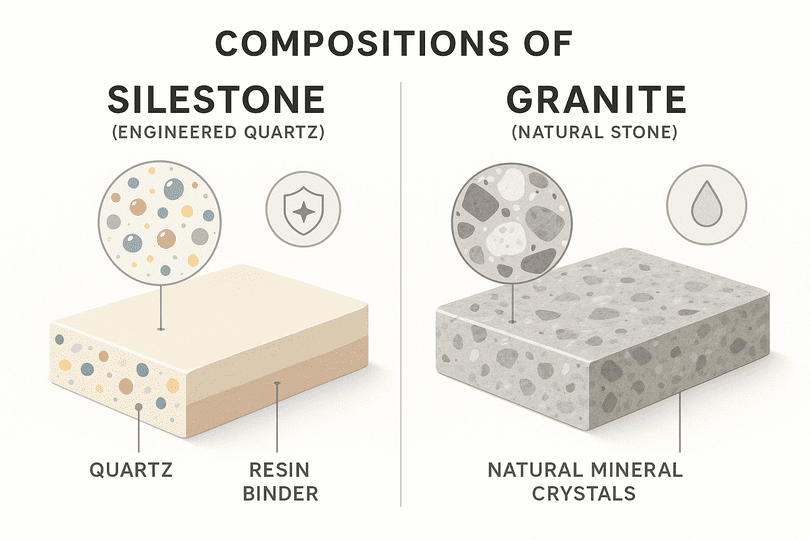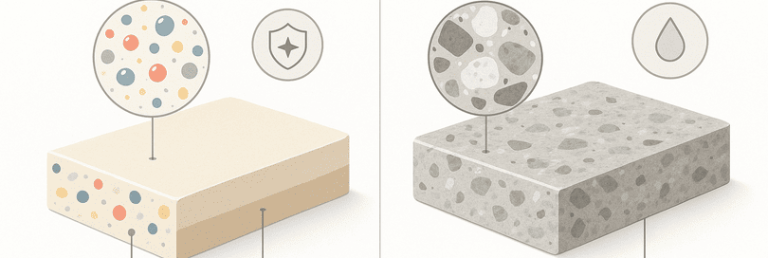Choosing the right worktop material can transform your kitchen. Among the most sought after options are quartz surfaces like Silestone and Sensa granite. Both deliver impressive results but they differ in origin, appearance, maintenance, and performance. Understanding the difference between silestone and granite will help you decide which best suits your space and lifestyle.
Understanding the Composition of Silestone and Granite Worktops
Silestone and Sensa granite are highly regarded, but they originate from very different processes.
- Silestone quartz is engineered using quartz crystals with resin binders and pigments. This creates a non porous surface with consistent colour and pattern across installations.
- Sensa granite is a natural stone, chosen for its mineral formations and natural beauty. It is treated to improve stain resistance while keeping its authentic character.
Because Silestone is manufactured, it offers uniformity and additional hygiene benefits. Sensa granite, by contrast, highlights the uniqueness of natural stone, where no two slabs are the same.

Natural Origin Versus Engineered Surfaces for Modern Kitchens
The type of surface you choose for your kitchen worktop directly affects both its style and practicality. Granite and Silestone may seem similar at first, but their origins set them apart. Understanding how natural and engineered materials perform in a modern kitchen will help you decide which one best suits your needs.
- Granite as a natural stone
Granite is formed over millions of years deep within the earth’s crust, making each slab entirely unique. Its mineral veining, colour variations, and natural beauty mean no two granite worktops are ever the same. This individuality creates a sense of luxury and authenticity that works particularly well in kitchens designed to showcase natural character. Granite is also strong and heat resistant, making it both beautiful and practical. - Silestone as an engineered surface
Silestone quartz is created by combining natural quartz crystals with resins and pigments. This engineering process allows for consistent colour and texture, which is ideal when a uniform finish is required across large kitchen layouts. Because it is non porous, Silestone resists stains and bacteria more effectively than natural stone, and it requires no sealing. These qualities make it especially suited to busy modern homes where ease of maintenance is valued. - Balancing natural and engineered options
Both granite and Silestone offer long term durability and visual appeal, but they cater to different design preferences. Granite worktops provide individuality and organic beauty, while Silestone delivers reliability, consistency, and contemporary style. Homeowners and professionals can decide based on whether they value natural uniqueness or engineered precision.
Granite captures the raw artistry of nature, while Silestone reflects innovation and engineered performance. Your choice depends on whether you prefer the individuality of natural stone or the refined uniformity of an engineered surface.
Style and Colour Options: Choosing the Perfect Fit for Your Space
Both Silestone quartz and granite worktops can transform a kitchen, but they offer different stylistic qualities.
- Silestone quartz provides reliable consistency. Its advanced production process ensures even tones and patterns, ideal when matching large kitchen islands with adjoining countertops. Options range from pure whites to greys and darker shades, designed to suit modern and traditional interiors alike.
- Sensa granite showcases the natural artistry of stone. Each slab features distinctive veining, flecking, and mineral deposits, meaning no two granite worktops are ever the same. This individuality makes granite a bold choice for homeowners who value natural character.
Choosing between them comes down to whether you prefer a sleek, uniform finish or a surface with organic variation.
How Silestone Quartz Offers Consistency Compared to Natural Granite Variations
One of the biggest differences between quartz and natural stone is how predictable the appearance of the finished surface will be. For many homeowners and designers, consistency across large worktops or multiple slabs is essential, especially in modern kitchens where clean lines and uniform tones are part of the design. This is where Silestone quartz has a clear advantage.
Silestone is engineered using ground quartz crystals mixed with resins and pigments. This controlled manufacturing process produces slabs that are highly consistent in both colour and pattern. Whether you are fitting a single worktop or combining several pieces across a large island and adjoining counters, Silestone quartz ensures the finished look remains smooth and coordinated. Popular shades include bright whites, soft greys, and warm neutrals that integrate easily with a wide range of kitchen styles.
Granite worktops, by contrast, showcase the natural artistry of stone. Each slab forms over thousands of years, resulting in unique veining, flecks, and mineral variations. This individuality gives granite countertops their appeal, but it can also make it difficult to achieve perfect continuity between separate slabs. Even when sourced from the same quarry, the natural patterns in granite can vary noticeably.
Both options offer strong design benefits. Silestone suits projects where a seamless, predictable finish is preferred, while granite provides distinctive, one of a kind character. The choice depends on whether you prioritise uniformity or natural variation in your kitchen design.
Durability and Maintenance Requirements for Lasting Performance
Both Silestone quartz and granite are valued for durability, but their maintenance needs differ:
- Granite countertops are naturally heat resistant and can handle hot pans without damage. However, as granite is porous, it benefits from protective treatment and occasional care to prevent staining.
- Sensa granite comes with a special treatment that makes it more resistant to stains than untreated granite. Regular cleaning with mild products helps it retain its polished finish for years.
- Silestone quartz is non porous, which means it resists stains, scratches, and bacteria. It is also highly heat resistant and can have short contact with hot cookware without damage, though protective mats are still recommended.
Everyday use is well supported by both materials, but Silestone is more convenient for busy households, while granite appeals to those who value natural authenticity with manageable upkeep.
Upgrade Your Kitchen with Expert Installation
Whether you value the character of natural granite or the consistent performance of Silestone quartz, both options deliver exceptional quality. Premium Worktops includes templating and installation in every quote, and offers nationwide service with a 7-10 working day turnaround.
You can also request up to three free samples to assess colours and finishes before making a choice. Warranty terms vary by material (typically starting at 10 years), and installation carries a standard 1-year warranty. Submit your free online quote now to explore options and begin your kitchen transformation with confidence.
